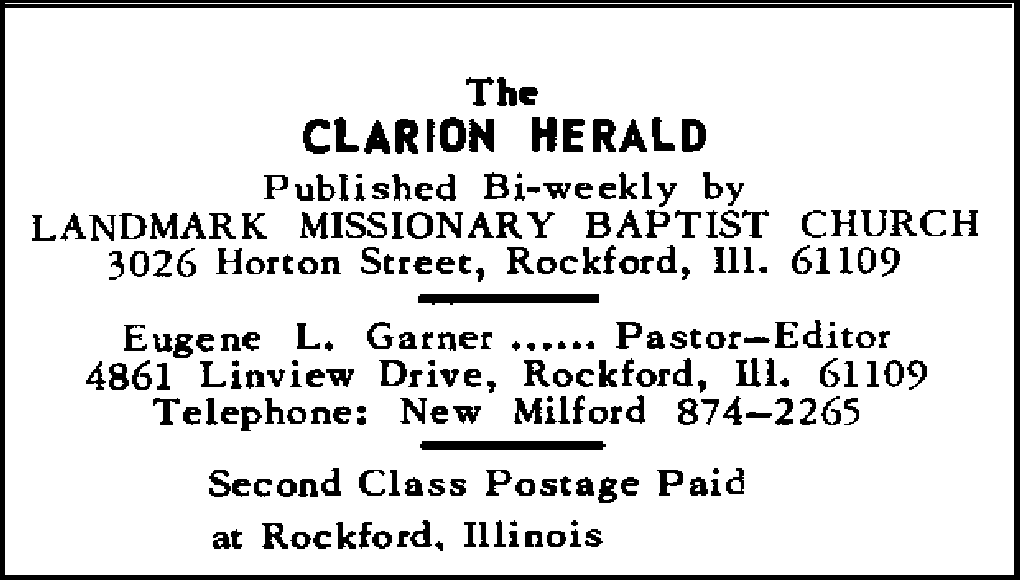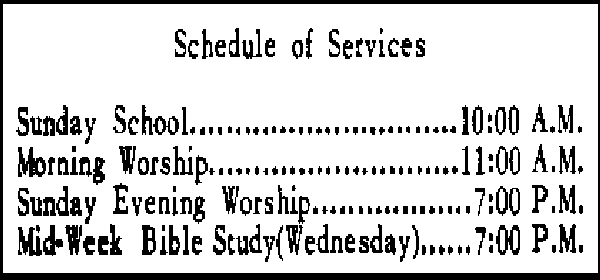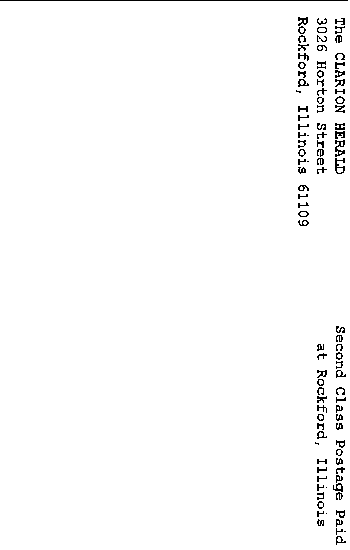
|
 |
 |
 |
|
 
|
|
|
"FELLOWSHIP '79' NOW HISTORY
Though attendance at our recent Fellowship Meeting was much smaller than in previous years, the Lord gave us a great time together in His Word. Every sermon was a blessing. And the devotionals (brought largely by non-preachers) were a real source of encouragement. Even though we had fewer special musical numbers than usual, each one was superb, and a blessing.
Our hearts were especially moved on Thursday evening when Bro. Wayne Waters, from Anchorage, Alaska, stepped forth to ask for our prayers that he might clearly discern the Lord's will for his life -- expressing an earnest desire that Jesus Christ be King of his heart and life.
Speaking during the services were brethren: Harry McAdams, Chas. D. Loper, Richard Kamerman, Lonnie Ford, Dennis Nixon, Reed Williams, Mitchell Lewis, David Ruff, Rick Wade, Wayne Waters, Edward Byrd, James Danley, James D. Floyd and Ray Williamson.
Our ladies did their usual magnificent job of providing food for our guests. Thanks to ALL who contributed to the success of "FELLOWSHIP '79."!!
|
|
|
|
EDITOR'S MOTHER NOW WITH THE LORD
Early on the morning of October 20, the Lord, in His mercy, called my mother into His presence. Two days earlier she had suffered a massive stroke that left her totally paralyzed -- except for her respiratory system.
Though we will miss her dearly, we would not wish her back from the blessed realm of life, health and peace into which she has entered. Having loved and served the Lord for many years, she has now been permitted to experience that for which I have heard her often, and longingly sing:
"0 I want to see Him,
Look upon His face;
There to sing forever
Of His saving grace.
On the streets of glory,
Let me lift my voice.
Cares all past; home at last;
Ever to rejoice."
Reunited with many loved ones who have preceded her into the heavenly country, she has now been liberated from pain, heartache and trials that made her longing to be with the Lord more intense.
Thank God, for the hope of life beyond the grave. The parting is
(Continued on Page 4)
|
|
|
|
|
Page - 2
THE CIVIL TRIAL OF JESUS
When Jesus was brought before the Council (in the palace of Caiaphas) the action was both irregular and illegal. It was not lawful for the Council to sit until after the break of day, but Jesus was tried and condemned shortly after midnight. Thus, at daybreak the Council met hastily in order to ratify a decision already taken -- trying to give their action an appearance of legality.
Having held this brief session, they bound Jesus and led Him away to Pilate, the Roman governor. Their verdict was that Jesus was worthy of death. But they had no right to inflict the death penalty. Thus, they will attempt to persuade Pilate to uphold their verdict so that their will may be carried out.
It is here that the Ecclesiastical Trial ends and the Civil Trial begins. And it is commonly held that this is the time when Judas went out and hanged himself.
|
|
|
|
OUTSIDE THE HALL OF JUDGMENT
(See John 18:28-32)
Since entering this Gentile edifice would make them ceremonially unclean, the Jews would not enter the Hall of Judgment, (comp. Acts 10:28; 11:3). They were not willing to risk such defilement as would prohibit their participation in the great Feast of Passover that was drawing near, and which required their "purity".
As an act of accommodation to their religious scruples, Pilate moved the court outside. He asked the Jews what charge they were placing against their captive, (Jn. l8:29). And, with obvious insolence, they replied: "If he were not an evil-doer, we would not have delivered him up to thee!" (In essence they were saying: "You ought to trust our judgment"). They despised Pilate; but he alone had power to take the life of Jesus, and they wanted a speedy execution of the sentence they had already passed, (Matt. 26:66; Mark 14:64).
Their charge that Jesus was an "evil-doer" was entirely too vague for the governor; he was not willing to condemn a man to die because of some religious quarrel. Pilate recognized the charge as being related to the "character" of Jesus, rather than being an accusation of some SPECIFIC CRIME. Thus, He told them to: "Take YE him, and judge him according to your law!"
The chief priests were greatly miffed by this subtle reminder of their limited authority under Roman rule. So, they complained: "It is NOT LAWFUL for us to put any man to
|
|
|
|
|
death!" (See Ezek. 21:26-27; Hos. 3:5). It was then that they placed a three-fold charge of treason against Jesus. It was a "political" charge which they had NOT DISCUSSED in the Council. It was a pragmatic move, made with devilish shrewdness. They knew it was the only kind of charge that Pilate would consider, (Luke 23:2).
"We found this fellow perverting the nation" -- encouraging sedition (comp. Dan. 3:l2; Acts l7:7; 24:25). This charge was a lie, and the Jews knew it. Jesus had never spoken a single word against properly constituted CIVIL AUTHORITY: He was its Author!
They further charged: "He forbids the payment of taxes to Caesar", (Luke 20:21-25; Matt. 17:27). And they said: "He claims that he himself is Christ, a king". The whole charge was designed to frighten the governor; whose position was not very secure, and to force him into perverting the principles of Roman justice -- lest they report him to the Emperor. And Pilate understood their threat quite well.
Stung as he was by the implications of the Jewish strategy in this case, Pilate was more deeply moved by the perfect composure of Jesus. He was so MAJESTIC in His bearing; and He had made no effort to answer a single charge that the Jews had so hatefully flung at Him, (Matt. 27:12-14; I Peter 2:23).
*************
HAVE YOU WRITTEN US LATELY?
It is always a joy to hear from those who read the CLARION HERALD. May we hear from YOU during December or January?
|
|
|
|
Page - 3
INSIDE THE HALL OF JUDGMENT
That which took place inside the judgment hall, is recorded by John (l8:33-38). Pilate did not want to appear indifferent to the charge of political treason brought by the Jews, but he wanted to question the man privately. Thus, he asked Him plainly: "ARE YOU THE KING OF THE JEWS"?
Jesus inquired whether Pilate was making the inquiry out of genuine concern, or if he was simply taking up the gibe of the Jews (Jn. 8:34). And the governor protested that he was NO JEW; thus, he surely could not be expected to understand this puzzle that the leaders of Israel had created for him. What had Jesus done to incur such wrath, (John 18:35)?
Then Jesus assured Pilate that he had nothing to fear from a kingdom that "is not of this world", (John 18:36). If His kingdom were of this world, then His servants would have fought to keep Him out of the hands of such malicious men as the chief priests. But, the source of His kingdom is NOT earthly.
Once again Pilate inquired, "Are you, then, A KING?" And Jesus answered with equal plainness: "You say correctly that I AM A KING". (Berkeley, Jn. 18:37; comp. I Tim. 6:13). Then He continued, "For this purpose was I born, and for this I entered the world, that I might testify to the truth", (Isa. 55:4; Rev. 1:5; 3:14). Here are tremendous implications of His pre-existence and very deity -- which are not fully lost on the governor.
|
|
|
|
|
Page - 4
And "everyone who is a friend of Truth listens to my voice", added Jesus, (Williams Tr; see also: John 8:47; I John 4:6).
With the heart that was empty, yet longing for something that will fill its aching void, Pilate asked: "What IS truth?" And I do not believe for a moment that he was merely being flippant. It was not the question of a man who simply DID NOT CARE. His confrontation with the Master had aroused something within his heart that was strange and puzzling to him; but he was weary of pursuing anything so visionary as "a quest for truth".
|
|
|
|
Going outside to the Jews, Pilate announced his verdict: "I FIND HIM NOT GUILTY AT ALL!" (Jn. 18:36; I Peter 1:18-19; 2:22). According to Luke, this so infuriated the priests that they became fierce in their outrage, (Psa. 2:2; Acts 4:25-26). "He STIRRETH UP THE PEOPLE, teaching throughout all Jewry, beginning from Galilee to this place" cried those who hated the Son of Man, (Luke 23:6-7).
In the word "Galilee" the quick-minded Pilate heard something that was most delightful to his ear. If Jesus was from Galilee he was from the area of Herod's jurisdiction, (Luke 3:1). Herod was in Jerusalem at that very moment; he would refer this case to him.
There are two basic reasons why Pilate decided to send the innocent Jesus to Herod. It would take a most difficult case off his hands; he could see that the Jews were in no mood to accept his verdict. And, such a gesture of respect for the king MIGHT tend to heal a personal breach that had festered for too long between the two Roman rulers.
So, JESUS IS SENT TO HEROD.
EDITOR'S MOTHER ... Continued
NOT forever. Through trust in the Lord we expect to meet again at the hour of His appearing -- or whenever we are summoned to share His glorious presence.
Thank God for a MOM who taught me, early in life, to TRUST IN HIM! Her faithful love and earnest prayers never wavered in the days of my own wandering and rebellion. Her love, like that of her Lord, was "to the uttermost". E.G.
|
|
|
|
|
 |
 |
 |
|




